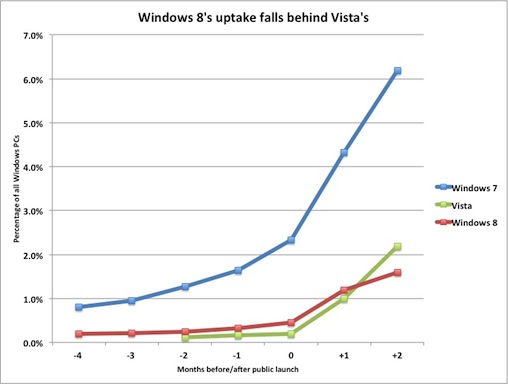With just a week left in the month, Windows 8's usage uptake has slipped behind Vista's at the same point in its release, data from a Web measurement company showed.
According to Net Applications, Windows 8's online usage share through Dec. 22 was 1.6% of all Windows PCs, an uptick from 1.2% of November. Windows 8 publicly launched on Oct. 26.
At the same two-month mark in Vista's release timetable, that OS accounted for 2.2% of all Windows systems, double the month prior.
Net Applications measures operating system usage by recording the specific operating system and version used by the machines of visitors to approximately 40,000 sites it monitors for clients.
The slowdown in uptake of Windows 8 and its poor performance compared to Vista is a troubling sign for the new operating system. Vista has been labeled a rare Microsoft failure, in part because it was adopted by far fewer customers than either its predecessor, Windows XP, or its successor, Windows 7.
Vista's online usage share peaked in the fall of 2009 at 20.3% of all Windows systems.
While there are nine days of Windows 8 data for December still to be released by Net Applications -- including Christmas, when a substantial number of Windows 8 PCs may have been given as gifts, and thus not included in the online estimates -- the new OS would have to record an amazing usage jump during December's final week to put it on par with Vista's 2007 pace.
By Computerworld's calculations, Windows 8's share of all Microsoft-powered PCs would have to leap to 4% in December's final week to equal Vista's second-month total. To give an idea of the magnitude of that required fourth-week increase, Net Applications said that Windows 8's share of all Windows PCs for the week ending Dec. 22 was 1.7%, and for the week ending Dec. 15, was 1.6%.
Net Applications' statistics continue to corroborate data from others that show Windows 8 has not generated the PC sales "pop" historically seen after the launch of a new Microsoft OS. In late November, the NPD Group said that in four weeks surrounding Windows 8's Oct. 26 debut, 21% fewer PCs were sold to U.S. consumers than during the same period in 2011.
Newer NPD numbers, cited by the New York Times last weekend, said U.S. consumer sales of Windows machines from late October through the first week of December were down 13% compared to the same stretch last year.
And even if Windows 8 makes a showing strong enough this month to match Vista, it will continue to have difficulty keeping pace: By the end of Vista's third month, it accounted for 3.3% of all copies of Windows. To equal that, Windows 8 would have to double its current share by the end of January 2013.

Windows 8's uptake trajectory fell behind Vista's for the first time this month. Note: Windows 8's usage share is through Dec. 22 only.
Windows 8's uptake was even more sluggish when compared to Windows 7, the 2009 operating system that has flourished as much as Vista flopped.
By the end of its second month of availability, Windows 7 accounted for 6.2% of all Windows machines, or nearly four times that of Windows 8 as of Dec. 22.
At this point, it looks virtually impossible for Windows 8 to do as well as its immediate predecessor, at least in the short run: At the end of Windows 7's third month -- analogous to Jan. 31, 2013 for Windows 8 -- it had gained another two percentage points to end with an 8.2% share of all Windows systems.
In fact, Windows 7 continued to gain share in December, according to preliminary numbers from Net Applications. Through Dec. 22, Windows 7's usage share of all personal computers was 45.6%, or nine-tenths of a percentage point higher than at the end of November.
To put that in perspective, Windows 7 gained more than twice the share through Dec. 22 than did Windows 8.
Windows 8's failure to stay abreast of Windows 7 or even Vista is not hard to explain, said analysts, who have been predicting a weak reception for the new operating system, blaming a weak economy, the OS's confusing dual user interfaces, enterprise upgrade fatigue after migrating to Windows 7, and competition from rivals' tablets -- including Apple's iPad, Amazon's Kindle and Google's Nexus -- for customers' technology dollars.
Neither Vista nor Windows 7, of course, had to face competition from tablets.
And that, experts have said, is paramount. Because Windows' success is directly tied to the number of new PCs sold, sluggish system sales caused by defections to tablets translates into a slow-down in operating system's uptake.
And people, whether consumers or enterprise workers, are increasingly turning to tablets -- virtually all of which run a non-Microsoft OS -- as their preferred mobile device, reducing sales growth of Windows notebooks and generally stretching everyone's PC refresh cycle. Research firm IDC, for instance, recently raised its 2012 tablet sales forecast to 122 million devices, up 72% from 2011.
Earlier this year, IDC said that total worldwide PC shipments would reach 367 million in 2012, less than 1% above 2011's 364 million.





